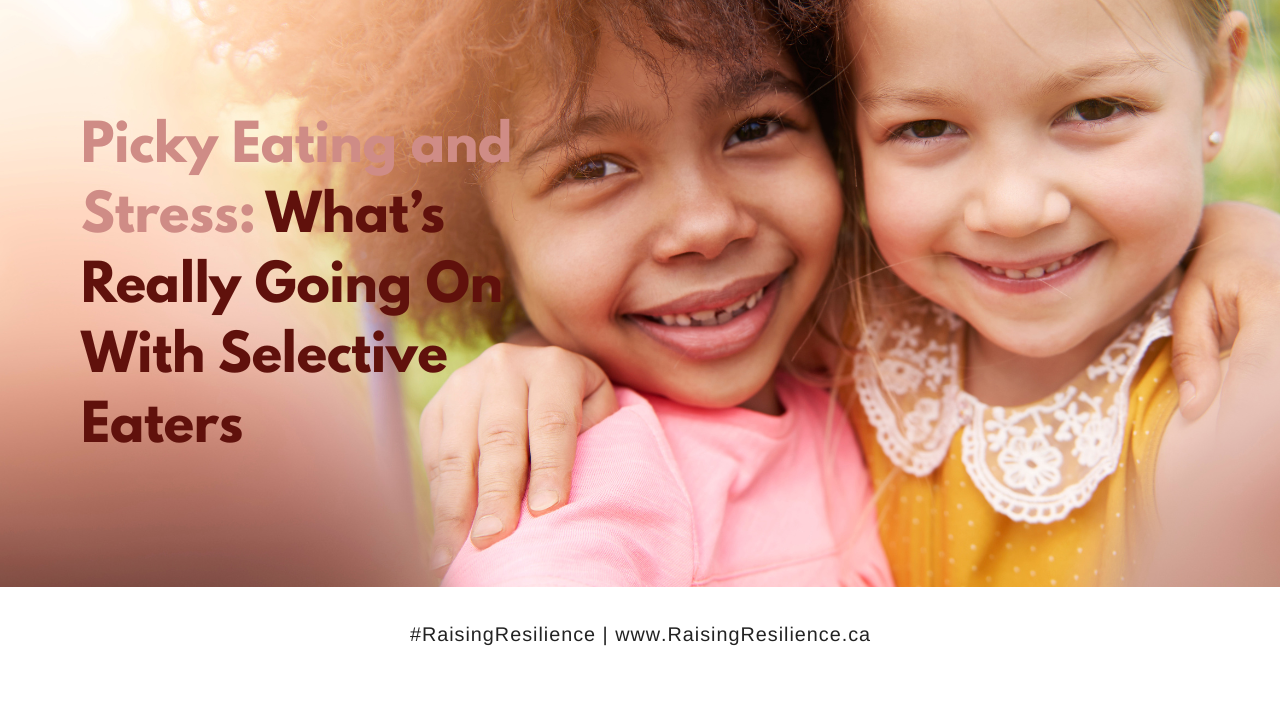Rethinking Picky Eating: What your child's nervous system might be telling you

If your child refuses foods they once loved or melts down the moment a plate hits the table, it’s easy to assume picky eating is about preferences, willfulness, or sensory quirks.
But through years of helping families understand behavior through the lens of biology, attachment, and stress, something has become very clear: picky eating is rarely about the food.
More often, picky eating behavior is a stress response (or even a sign of stored trauma) showing up at the table. And once you understand that, everything about feeding your picky child changes.
Could Stress Cause Picky Eating? Yes, Here’s How
Seeking nourishment is the very first instinct we activate as newborns. So if a child avoids food, gags on textures, becomes rigid, or shuts down around meals, the real question becomes: What is getting in the way of that instinct?
Eating requires a felt sense of safety. When a child’s nervous system perceives threat - emotional, sensory, or physical - it moves into one of its stress states: fight, flight, or freeze.
In that state the following happens:
-
curiosity around food drops
-
digestion slows
-
texture, smell, and sound sensitivities heighten
-
the body wants to move, or gets rigid, or checks out (depending on the extent of the stress)
Sound familiar? The body prioritizes protection over nourishment when it's stressed. This is why pressure-based strategies like, “Sit until your plate is clear”, or “Just take one bite” often backfire. These well-meaning tactics push an already stressed child further into overwhelm and make matters worse!
But Where’s the Stress Coming From?
Parents often tell me, “But my child isn’t stressed, they have everything they could ever want!”
Fair question... and here's my answer: Stress isn’t just emotional, and trauma doesn’t require a dramatic event.
Medical researchers like Dr. Aimie Apigian and Dr. Gabor Maté have explained that stress and trauma are simply two physiological states of the nervous system. They have very little to do with the event that triggered them; they have everything to do with how that event landed on the body.
Stress is an activated nervous system state, whereas trauma is a state of overwhelm that happens when demand exceeds capacity.
Common stress and trauma triggers that could show up as picky eating may include:
-
early feeding struggles
-
medical procedures
-
digestive pain
-
sleep training or separation stress
-
sensory overwhelm
-
inconsistent routines
-
pressure around eating or performing
-
relational tension or attachment wounds
If a child is in a stress state, they are not likely to eat the beautiful food you've prepared for them.
Signs Your Child’s Picky Eating Is a Stress Response
Reflect on the following questions to consider if your child’s picky eating is actually a stress response:
-
Did feeding feel stressful in infancy?
-
Does your child experience digestive pain or constipation?
-
Do they get overwhelmed easily in other areas of life?
-
Was there early medical or developmental stress?
-
Are family interactions tense or unpredictable at times?
When we widen the lens beyond food and look at stress patterns, the root of behavior sometimes becomes more clear. And when we have that clarity, we can stop reinforcing the stress cycle at the table.
4 Ways To Help a Picky Eater by Supporting Safety
If picky eating is driven by stress, the solution starts outside the food environment. We focus on creating safety, regulation, and trust elsewhere, and allow kids to bring that felt sense to the dinner table. Here are some tips.
1. Regulate Yourself First
Your calm body is the strongest tool you have. Children borrow regulation from you. When you’re steady, they soften.
2. Keep Schedules Predictable
Routine reduces overwhelm. Gentle structure and neutral language give the nervous system room to relax.
3. Support Regulation All Day
Movement, restorative sleep, and outdoor time help create a foundation for nervous system regulation. That can make eating feel safer.
4. Connect, Connect, Connect
Spend focused time with your child and really SEE and LISTEN to them in an authentic way.
Build trust outside mealtimes. When trust and safety increase in the relationship, flexibility with food naturally increases too.
The Bottom Line: Picky Eating Is Often About Safety, Not Defiance
When we understand picky eating as a stress response, it stops feeling confusing and starts making sense. Kids caught in stress-based eating patterns aren’t trying to be difficult. They’re trying to feel safe.
And safety is something we can nurture.
When we support the nervous system first, eating becomes easier. Mealtimes soften. Curiosity returns. And food once again becomes an experience of connection and nourishment.
Related Posts:
Helping kids find calm: https://www.jesssherman.com/blog/child-mental-health
Using Amino Acids for calm: https://www.jesssherman.com/blog/amino-acids-for-mental-wellness-in-kids
Other contributors to picky eating: https://www.jesssherman.com/blog/what-causes-picky-eating






